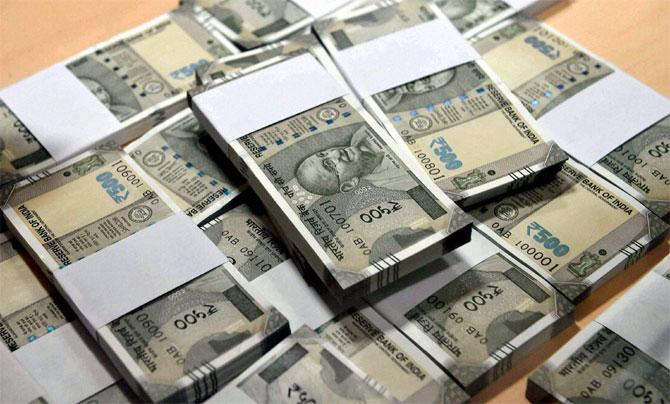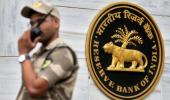Money permits patronage.
Money means power.
No wonder details of the crores locked up in NPAs and never repaid loans are top secret, says Sunanda K Datta-Ray.

It could well be the turn of private banks next.
Some would call it 'organised loot and legalised plunder', but the truth is it takes a deal of money for rulers to rule.
Modern ministers therefore yearn as much as medieval monarchs did to get their hands on the cash.
If central banks remain disobliging, governments may have to turn to private savings.
No wonder The Wall Street Journal reports that more than 1,700 US banks downed shutters in 12 months while Donald Trump accused the Federal Reserve, which resists his deficit-swelling tax cut stimulus, of going 'loco'.
It's open season on central banks.
Turkey's central bank incurred Recep Tayyip Erdogan's wrath by sharply raising interest rates to control a currency crisis that rattled markets worldwide, causing inflation to surge 18 per cent, and slashing 40 per cent of the lira's value against the dollar.
Italy's Deputy Prime Minister Luigi Di Maio is also at war with the European Central Bank over Rome's borrowing and spending spree.
Italy is sui generis.
When the Italian delegate objected to landlocked Switzerland being represented at the UN by an admiral, the Swiss retorted he hadn't objected to Italy's representative being styled 'finance minister'.
Di Maio wants money not to fight elections for survival, but to finance a cornucopia of all too familiar populist promises such as lower taxes (though not easy credit for small and medium businesses), incomes for the poor, and deporting 500,000 migrants (no, not Rohingyas).
There's political dividend in financial largesse.
Viral Acharya, the embattled Urjit Patel's deputy in the Reserve Bank, used a cricketing analogy to distinguish central banks from governments.
While central banks play protracted Test matches, governments are immersed in single-innings T20s with an election always on the horizon.
Hence, the need for money.
England's Henry VIII looted monasteries and abbeys.
France's Sun King twisted aristocratic arms.
In democratic times, David Lloyd George thought selling honours the cleanest way of raising money.
Anything and everything in India -- licences, permits, introductions, telephone connections, services -- is for sale.
The proceeds can buy votes that enable politicians to make more money.
Money permits patronage.
Money means power.
No wonder details of the crores locked up in non-performing assets and never repaid loans are top secret.
Sanctioning them is an exercise of power.
Recipients enjoy the power that comes with the gift.
It's the ultimate refinement of the system that started with a 15th century Englishman called John Morton who demonstrated that even if water can't be squeezed from the proverbial stone, money can.
Henry VII, England's first Tudor king, made Morton archbishop of Canterbury and Lord Chancellor while the Pope sent him a cardinal's hat.
If someone lived frugally, the ingenious Morton turned the screws on him since it was obvious he must be salting away a fortune.
An extravagant lifestyle made things even simpler:
Clearly, the man was rich enough to cough up for the royal coffers.
People called the strategy Morton's Fork.
In one way or another, everyone was impaled on its prongs.
No one escaped.
It has been the envy ever since of tax authorities the world over and of politicians bent on raising funds.
Unlike today's politicians, Henry didn't have to buy millions of semi-literate voters through elaborate campaigns in vast constituencies sprawling across hill and jungle.
But he had to consolidate his own credentials.
The king was of humble birth and doubtful legitimacy.
His claim to the throne was shaky.
Money alone could put things right, and Morton's Fork provided it.
Historians were later to say that although Henry improved the economy, developed England's wool industry, and undertook major commercial and diplomatic initiatives, he was driven by greed.
A posthumous inquiry commission confirmed the lack of due process in his authoritarian administration which was riddled with abuses.
But Morton's Fork provided enough money to silence critics.
Morton, who predeceased the king, was assisted by two powerful members of the financial council, Edmund Dudley and Sir Richard Empson.
They were so unpopular that as soon as Henry died, his son arrested them for high treason and had them executed.
No wonder Louis XV declared, 'Apres moi, le deluge'. Another version has his mistress, Madame de Pompadour, exclaiming 'Apres nous, le deluge'.
'Me' or 'us' comes to the same thing.
Karl Marx called the phrase 'the watchword of every capitalist and of every capitalist nation'.
It's really the watchword of every corner-cutting, make-a-fast-buck, here-today-gone-tomorrow regime.
Viral Acharya called it the 'myopia or short-termism of governments'.












 © 2025
© 2025